Human Resources Analyst Resume Examples

Jul 18, 2024
|
12 min read
"Master the art of writing a standout human resources analyst resume: pinpoint your skills, highlight your experience, and give your career the analytical edge it needs with our step-by-step guide that's anything but HRdinary!"
Rated by 348 people
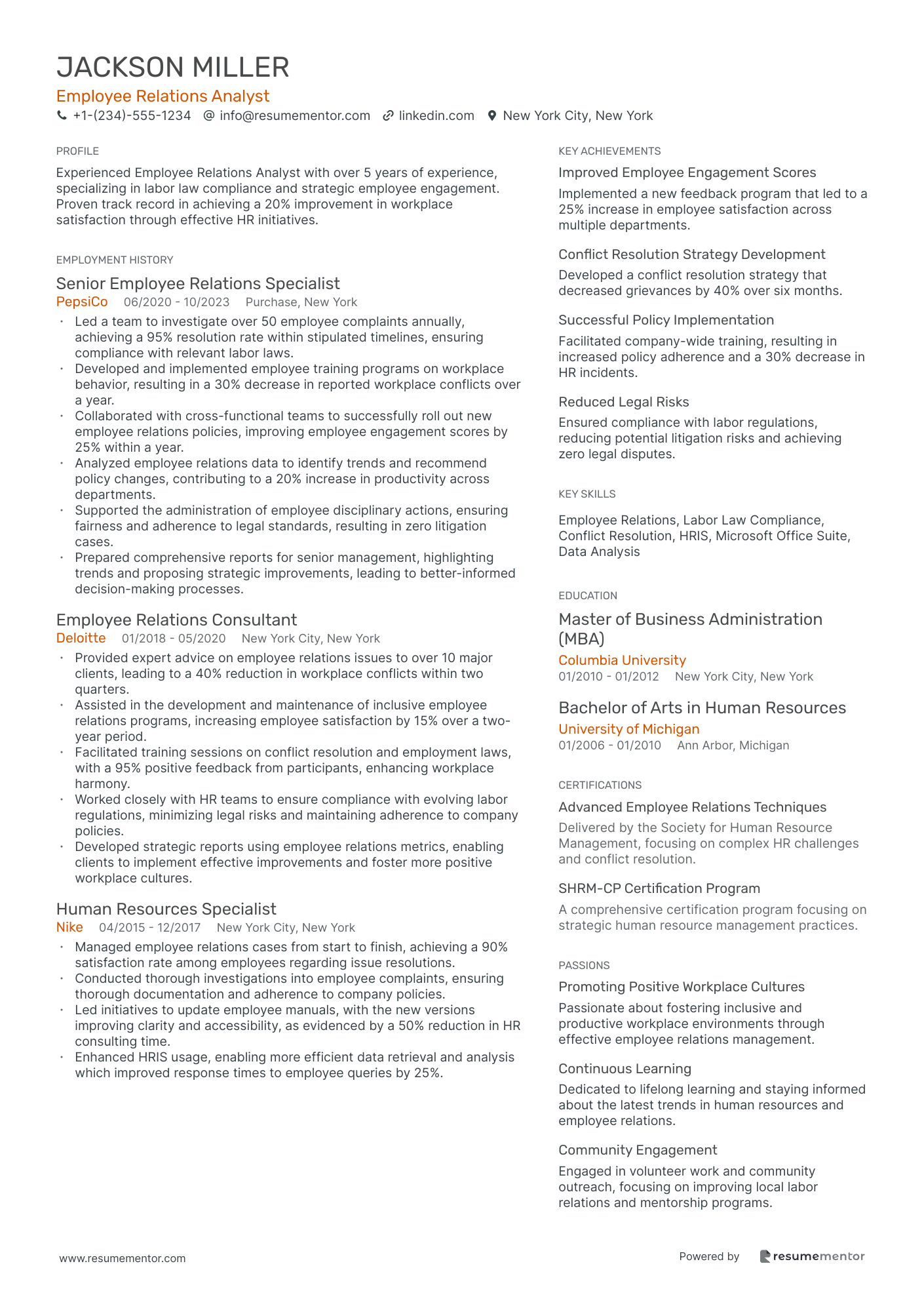
Employee Relations Analyst
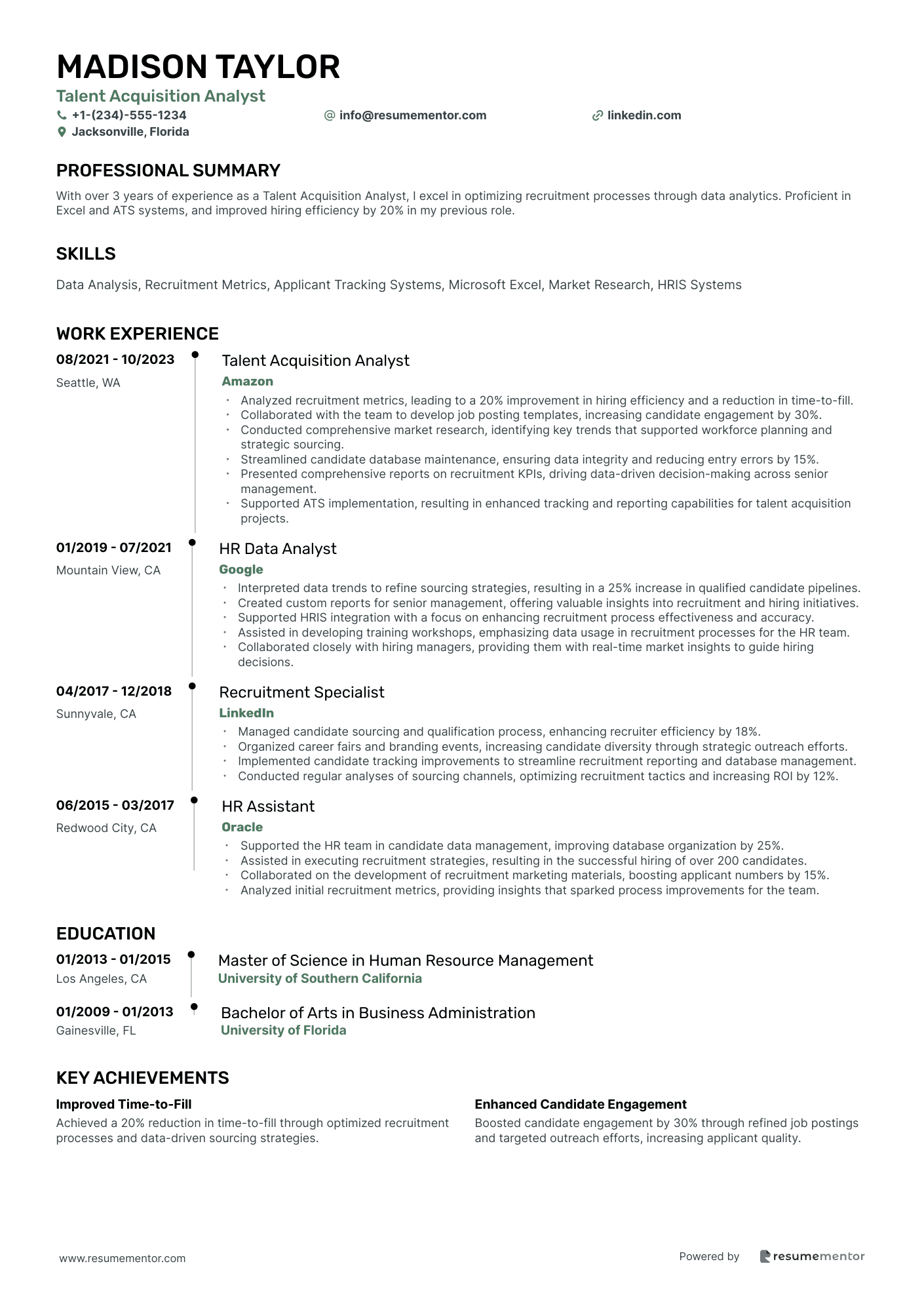
Talent Acquisition Analyst
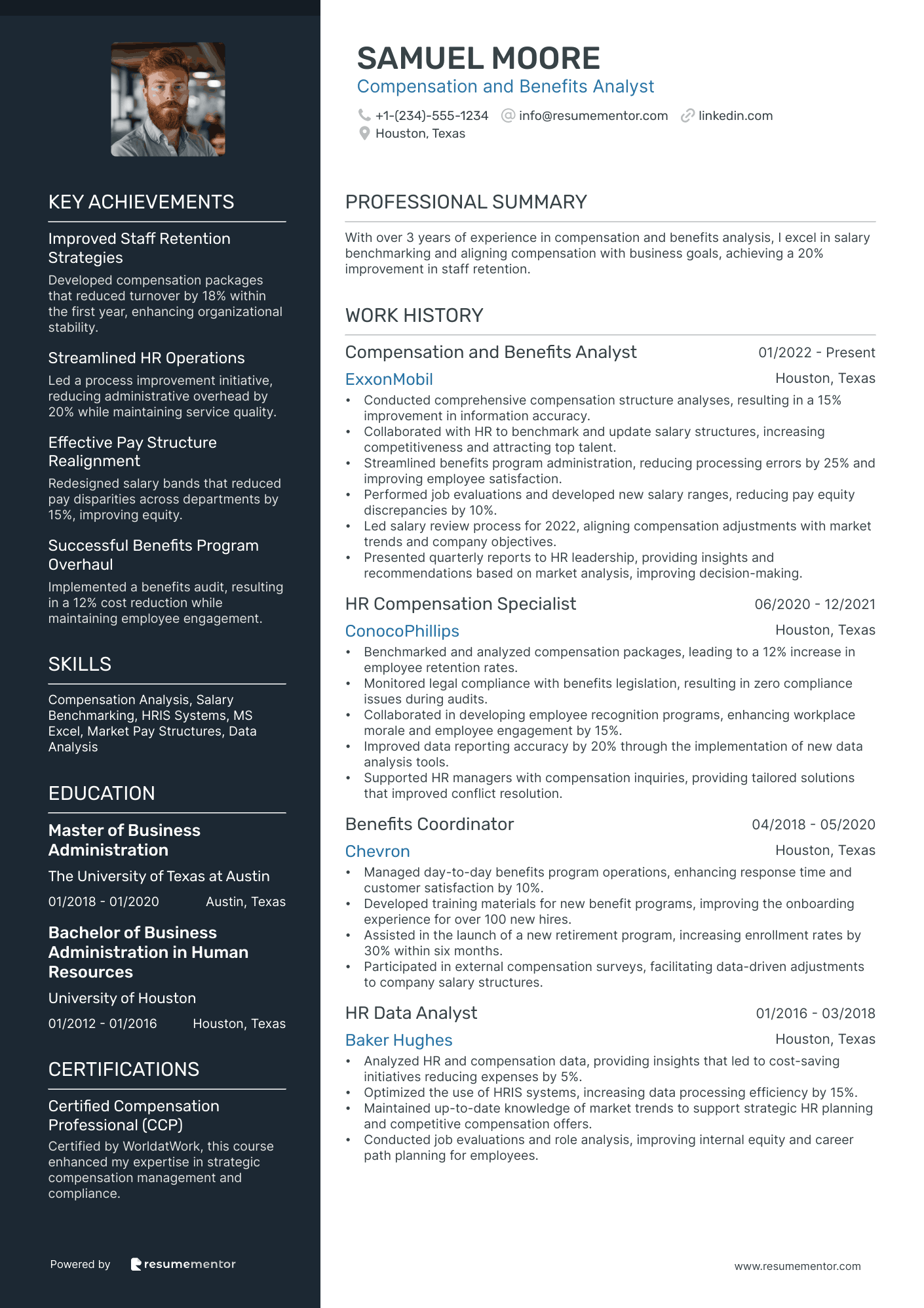
Compensation and Benefits Analyst
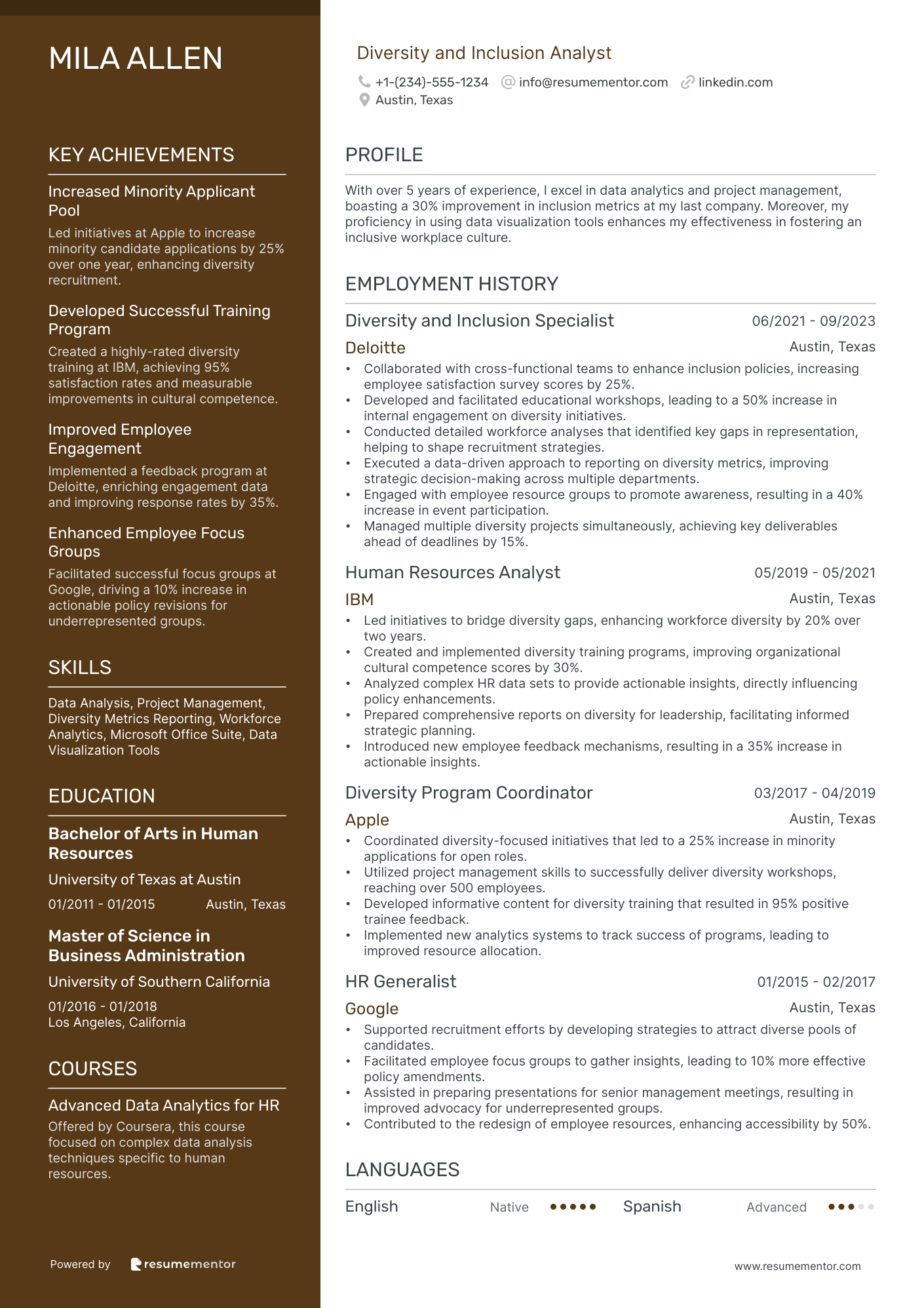
Diversity and Inclusion Analyst
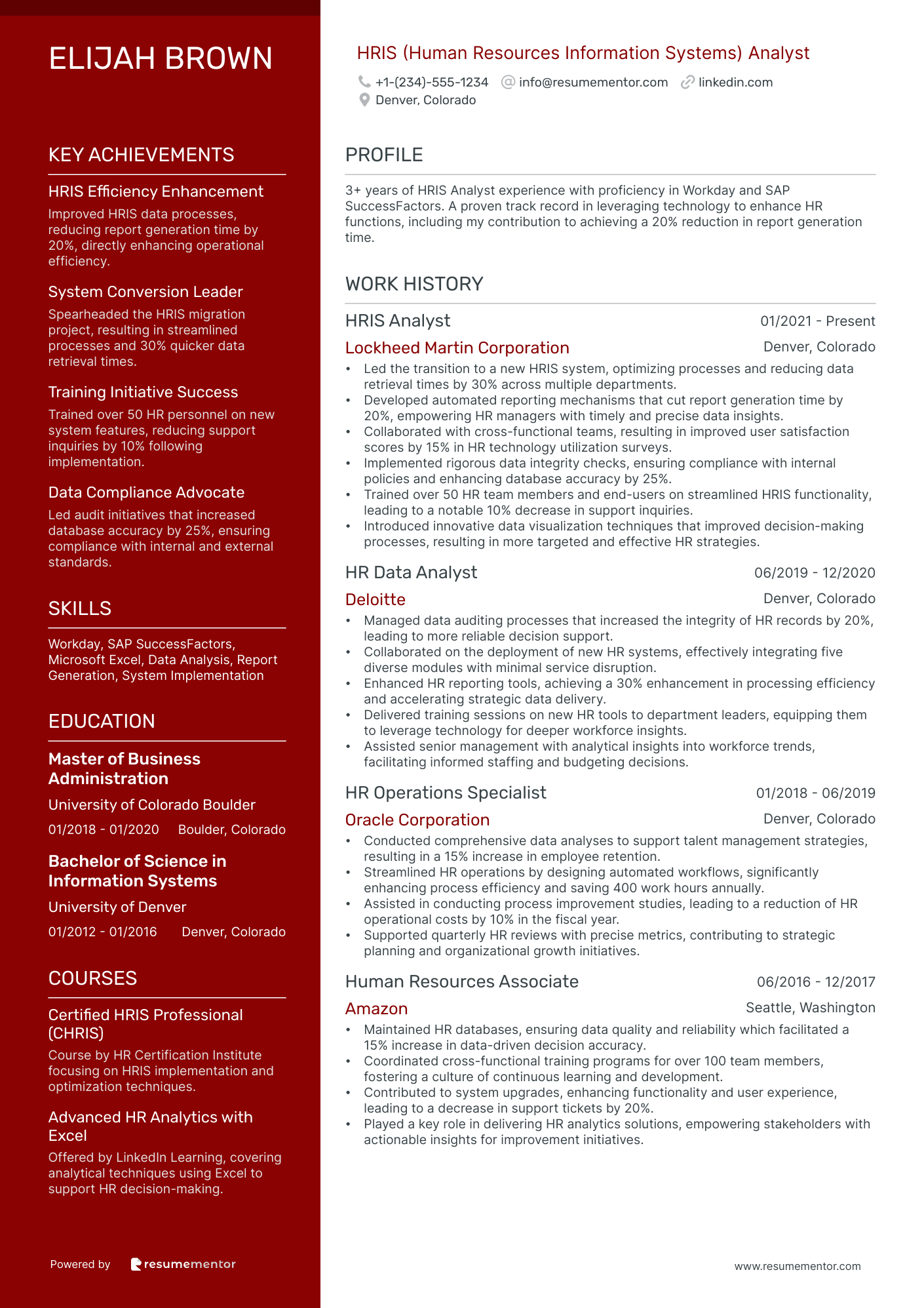
HRIS (Human Resources Information Systems) Analyst
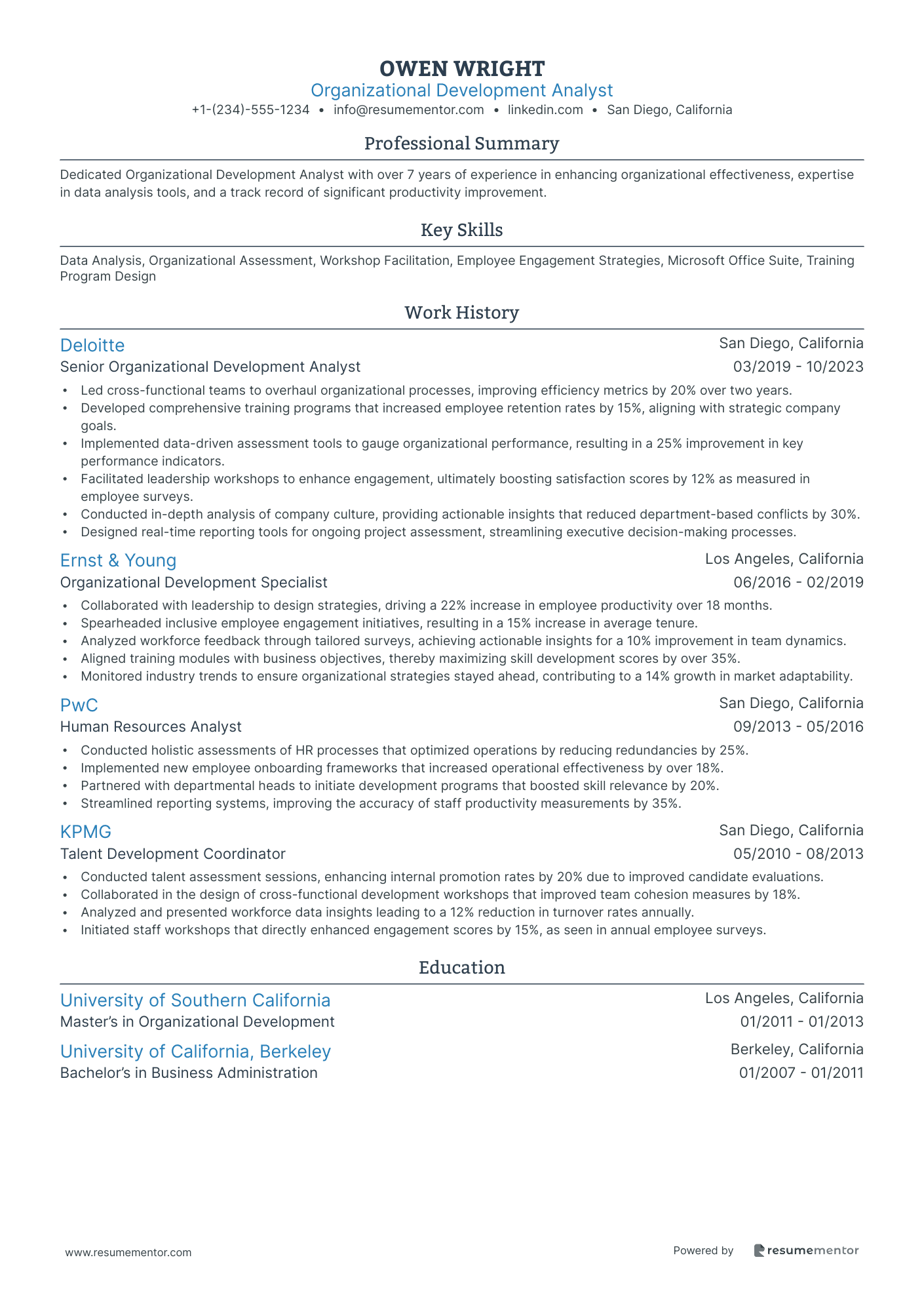
Organizational Development Analyst
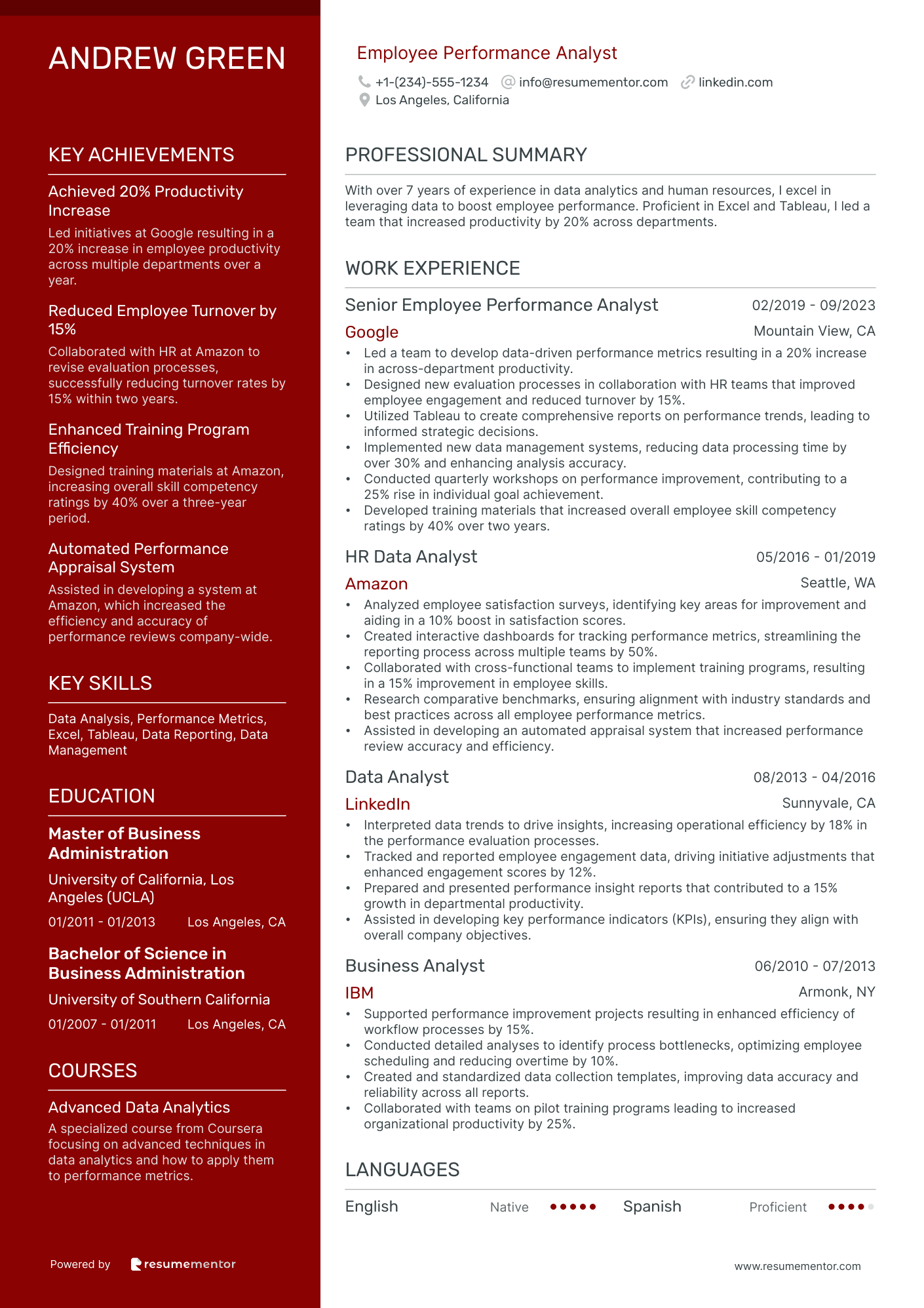
Employee Performance Analyst
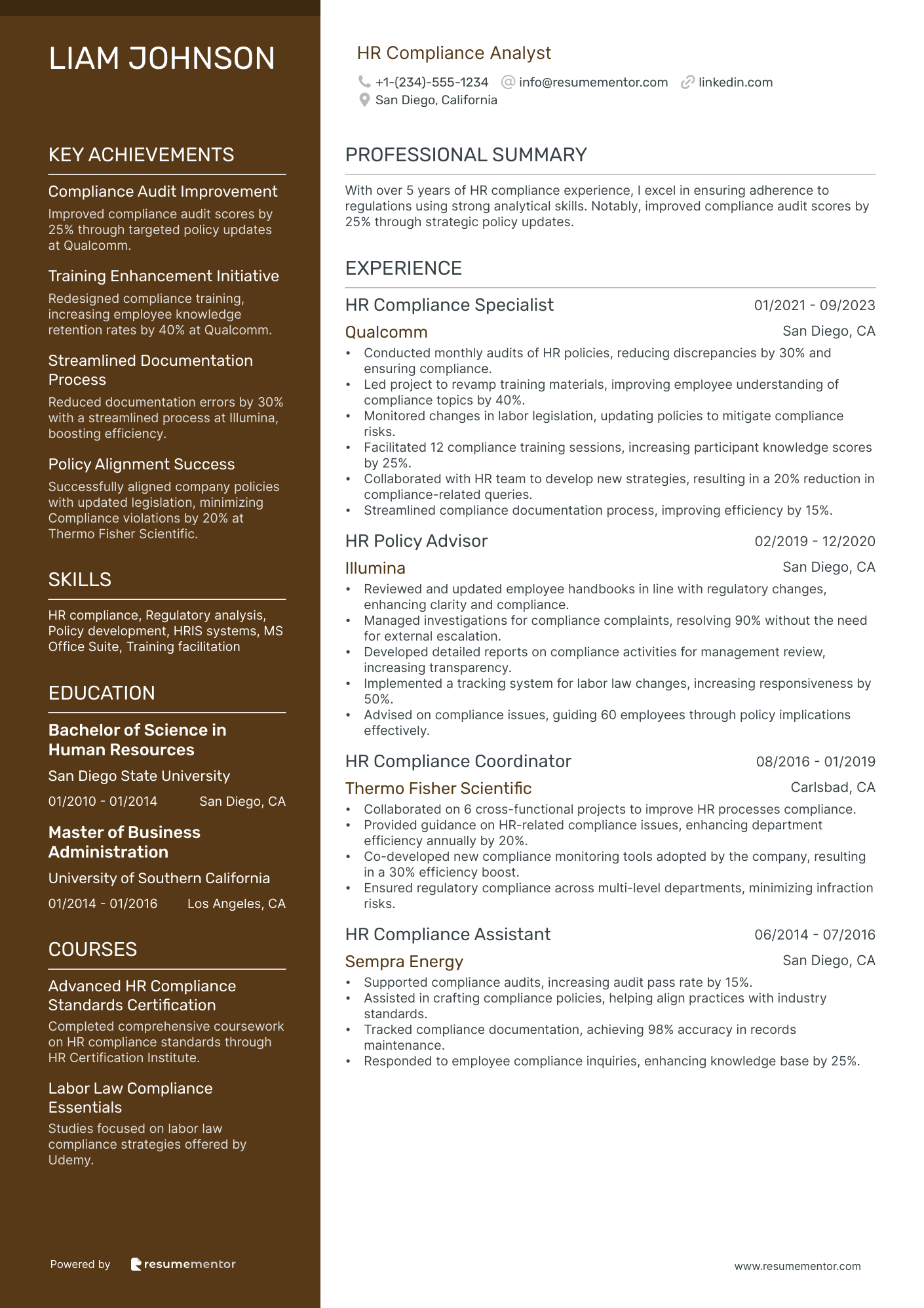
HR Compliance Analyst
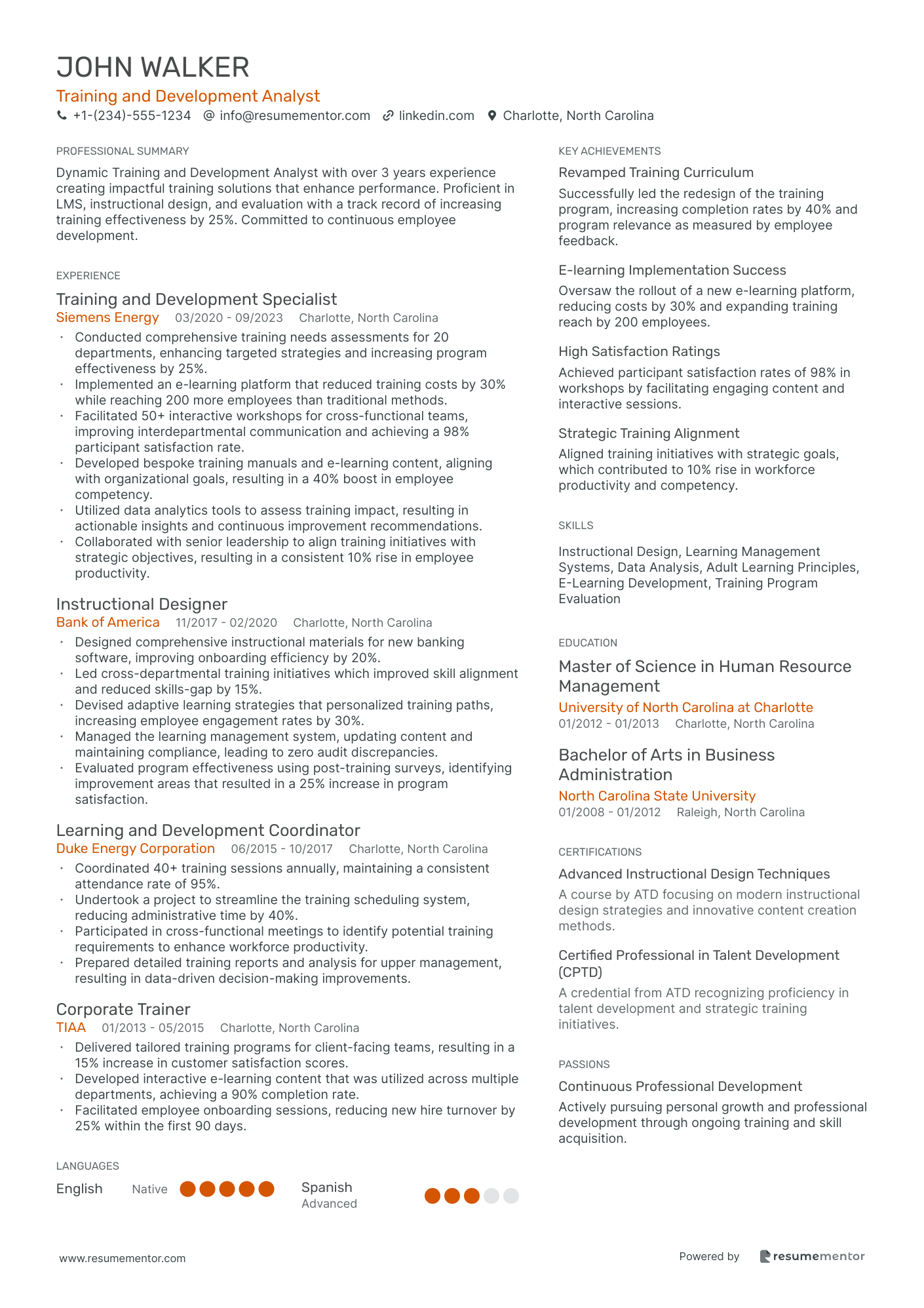
Training and Development Analyst
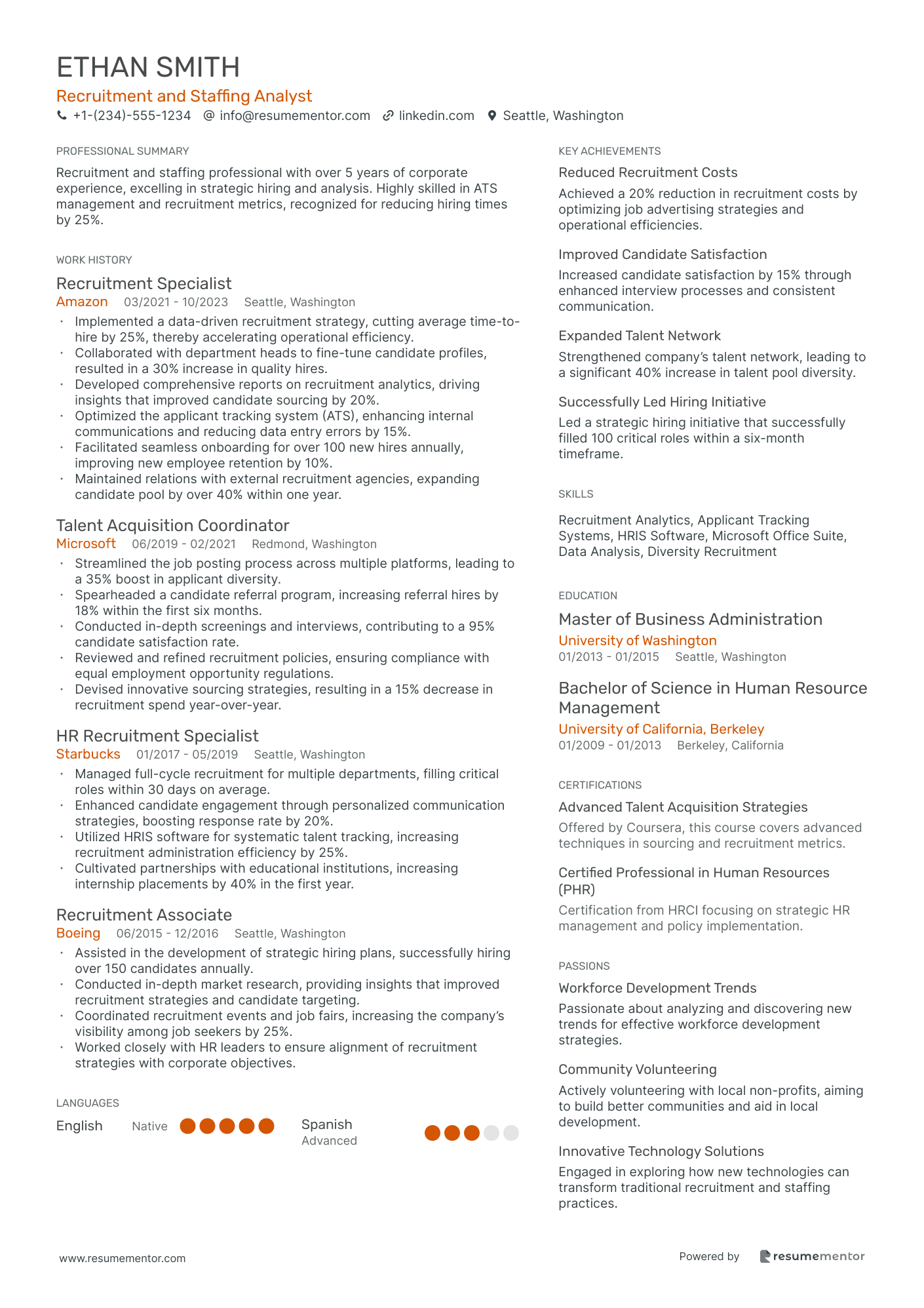
Recruitment and Staffing Analyst

Employee Relations Analyst resume sample
- •Led a team to investigate over 50 employee complaints annually, achieving a 95% resolution rate within stipulated timelines, ensuring compliance with relevant labor laws.
- •Developed and implemented employee training programs on workplace behavior, resulting in a 30% decrease in reported workplace conflicts over a year.
- •Collaborated with cross-functional teams to successfully roll out new employee relations policies, improving employee engagement scores by 25% within a year.
- •Analyzed employee relations data to identify trends and recommend policy changes, contributing to a 20% increase in productivity across departments.
- •Supported the administration of employee disciplinary actions, ensuring fairness and adherence to legal standards, resulting in zero litigation cases.
- •Prepared comprehensive reports for senior management, highlighting trends and proposing strategic improvements, leading to better-informed decision-making processes.
- •Provided expert advice on employee relations issues to over 10 major clients, leading to a 40% reduction in workplace conflicts within two quarters.
- •Assisted in the development and maintenance of inclusive employee relations programs, increasing employee satisfaction by 15% over a two-year period.
- •Facilitated training sessions on conflict resolution and employment laws, with a 95% positive feedback from participants, enhancing workplace harmony.
- •Worked closely with HR teams to ensure compliance with evolving labor regulations, minimizing legal risks and maintaining adherence to company policies.
- •Developed strategic reports using employee relations metrics, enabling clients to implement effective improvements and foster more positive workplace cultures.
- •Managed employee relations cases from start to finish, achieving a 90% satisfaction rate among employees regarding issue resolutions.
- •Conducted thorough investigations into employee complaints, ensuring thorough documentation and adherence to company policies.
- •Led initiatives to update employee manuals, with the new versions improving clarity and accessibility, as evidenced by a 50% reduction in HR consulting time.
- •Enhanced HRIS usage, enabling more efficient data retrieval and analysis which improved response times to employee queries by 25%.
- •Supported a workforce of 500 employees with comprehensive HR services, significantly improving employee relations and communication pathways.
- •Developed and facilitated onboarding programs that improved new hire retention rates by 15% over a one-year period.
- •Analyzed employee feedback survey data to recommend strategies that increased organizational commitment levels by 20%.
- •Collaborated with managers to process disciplinary actions, ensuring fair and consistent treatment in compliance with labor standards.
Talent Acquisition Analyst resume sample
- •Analyzed recruitment metrics, leading to a 20% improvement in hiring efficiency and a reduction in time-to-fill.
- •Collaborated with the team to develop job posting templates, increasing candidate engagement by 30%.
- •Conducted comprehensive market research, identifying key trends that supported workforce planning and strategic sourcing.
- •Streamlined candidate database maintenance, ensuring data integrity and reducing entry errors by 15%.
- •Presented comprehensive reports on recruitment KPIs, driving data-driven decision-making across senior management.
- •Supported ATS implementation, resulting in enhanced tracking and reporting capabilities for talent acquisition projects.
- •Interpreted data trends to refine sourcing strategies, resulting in a 25% increase in qualified candidate pipelines.
- •Created custom reports for senior management, offering valuable insights into recruitment and hiring initiatives.
- •Supported HRIS integration with a focus on enhancing recruitment process effectiveness and accuracy.
- •Assisted in developing training workshops, emphasizing data usage in recruitment processes for the HR team.
- •Collaborated closely with hiring managers, providing them with real-time market insights to guide hiring decisions.
- •Managed candidate sourcing and qualification process, enhancing recruiter efficiency by 18%.
- •Organized career fairs and branding events, increasing candidate diversity through strategic outreach efforts.
- •Implemented candidate tracking improvements to streamline recruitment reporting and database management.
- •Conducted regular analyses of sourcing channels, optimizing recruitment tactics and increasing ROI by 12%.
- •Supported the HR team in candidate data management, improving database organization by 25%.
- •Assisted in executing recruitment strategies, resulting in the successful hiring of over 200 candidates.
- •Collaborated on the development of recruitment marketing materials, boosting applicant numbers by 15%.
- •Analyzed initial recruitment metrics, providing insights that sparked process improvements for the team.
Compensation and Benefits Analyst resume sample
- •Conducted comprehensive compensation structure analyses, resulting in a 15% improvement in information accuracy.
- •Collaborated with HR to benchmark and update salary structures, increasing competitiveness and attracting top talent.
- •Streamlined benefits program administration, reducing processing errors by 25% and improving employee satisfaction.
- •Performed job evaluations and developed new salary ranges, reducing pay equity discrepancies by 10%.
- •Led salary review process for 2022, aligning compensation adjustments with market trends and company objectives.
- •Presented quarterly reports to HR leadership, providing insights and recommendations based on market analysis, improving decision-making.
- •Benchmarked and analyzed compensation packages, leading to a 12% increase in employee retention rates.
- •Monitored legal compliance with benefits legislation, resulting in zero compliance issues during audits.
- •Collaborated in developing employee recognition programs, enhancing workplace morale and employee engagement by 15%.
- •Improved data reporting accuracy by 20% through the implementation of new data analysis tools.
- •Supported HR managers with compensation inquiries, providing tailored solutions that improved conflict resolution.
- •Managed day-to-day benefits program operations, enhancing response time and customer satisfaction by 10%.
- •Developed training materials for new benefit programs, improving the onboarding experience for over 100 new hires.
- •Assisted in the launch of a new retirement program, increasing enrollment rates by 30% within six months.
- •Participated in external compensation surveys, facilitating data-driven adjustments to company salary structures.
- •Analyzed HR and compensation data, providing insights that led to cost-saving initiatives reducing expenses by 5%.
- •Optimized the use of HRIS systems, increasing data processing efficiency by 15%.
- •Maintained up-to-date knowledge of market trends to support strategic HR planning and competitive compensation offers.
- •Conducted job evaluations and role analysis, improving internal equity and career path planning for employees.
Diversity and Inclusion Analyst resume sample
- •Collaborated with cross-functional teams to enhance inclusion policies, increasing employee satisfaction survey scores by 25%.
- •Developed and facilitated educational workshops, leading to a 50% increase in internal engagement on diversity initiatives.
- •Conducted detailed workforce analyses that identified key gaps in representation, helping to shape recruitment strategies.
- •Executed a data-driven approach to reporting on diversity metrics, improving strategic decision-making across multiple departments.
- •Engaged with employee resource groups to promote awareness, resulting in a 40% increase in event participation.
- •Managed multiple diversity projects simultaneously, achieving key deliverables ahead of deadlines by 15%.
- •Led initiatives to bridge diversity gaps, enhancing workforce diversity by 20% over two years.
- •Created and implemented diversity training programs, improving organizational cultural competence scores by 30%.
- •Analyzed complex HR data sets to provide actionable insights, directly influencing policy enhancements.
- •Prepared comprehensive reports on diversity for leadership, facilitating informed strategic planning.
- •Introduced new employee feedback mechanisms, resulting in a 35% increase in actionable insights.
- •Coordinated diversity-focused initiatives that led to a 25% increase in minority applications for open roles.
- •Utilized project management skills to successfully deliver diversity workshops, reaching over 500 employees.
- •Developed informative content for diversity training that resulted in 95% positive trainee feedback.
- •Implemented new analytics systems to track success of programs, leading to improved resource allocation.
- •Supported recruitment efforts by developing strategies to attract diverse pools of candidates.
- •Facilitated employee focus groups to gather insights, leading to 10% more effective policy amendments.
- •Assisted in preparing presentations for senior management meetings, resulting in improved advocacy for underrepresented groups.
- •Contributed to the redesign of employee resources, enhancing accessibility by 50%.
HRIS (Human Resources Information Systems) Analyst resume sample
- •Led the transition to a new HRIS system, optimizing processes and reducing data retrieval times by 30% across multiple departments.
- •Developed automated reporting mechanisms that cut report generation time by 20%, empowering HR managers with timely and precise data insights.
- •Collaborated with cross-functional teams, resulting in improved user satisfaction scores by 15% in HR technology utilization surveys.
- •Implemented rigorous data integrity checks, ensuring compliance with internal policies and enhancing database accuracy by 25%.
- •Trained over 50 HR team members and end-users on streamlined HRIS functionality, leading to a notable 10% decrease in support inquiries.
- •Introduced innovative data visualization techniques that improved decision-making processes, resulting in more targeted and effective HR strategies.
- •Managed data auditing processes that increased the integrity of HR records by 20%, leading to more reliable decision support.
- •Collaborated on the deployment of new HR systems, effectively integrating five diverse modules with minimal service disruption.
- •Enhanced HR reporting tools, achieving a 30% enhancement in processing efficiency and accelerating strategic data delivery.
- •Delivered training sessions on new HR tools to department leaders, equipping them to leverage technology for deeper workforce insights.
- •Assisted senior management with analytical insights into workforce trends, facilitating informed staffing and budgeting decisions.
- •Conducted comprehensive data analyses to support talent management strategies, resulting in a 15% increase in employee retention.
- •Streamlined HR operations by designing automated workflows, significantly enhancing process efficiency and saving 400 work hours annually.
- •Assisted in conducting process improvement studies, leading to a reduction of HR operational costs by 10% in the fiscal year.
- •Supported quarterly HR reviews with precise metrics, contributing to strategic planning and organizational growth initiatives.
- •Maintained HR databases, ensuring data quality and reliability which facilitated a 15% increase in data-driven decision accuracy.
- •Coordinated cross-functional training programs for over 100 team members, fostering a culture of continuous learning and development.
- •Contributed to system upgrades, enhancing functionality and user experience, leading to a decrease in support tickets by 20%.
- •Played a key role in delivering HR analytics solutions, empowering stakeholders with actionable insights for improvement initiatives.
Organizational Development Analyst resume sample
- •Led cross-functional teams to overhaul organizational processes, improving efficiency metrics by 20% over two years.
- •Developed comprehensive training programs that increased employee retention rates by 15%, aligning with strategic company goals.
- •Implemented data-driven assessment tools to gauge organizational performance, resulting in a 25% improvement in key performance indicators.
- •Facilitated leadership workshops to enhance engagement, ultimately boosting satisfaction scores by 12% as measured in employee surveys.
- •Conducted in-depth analysis of company culture, providing actionable insights that reduced department-based conflicts by 30%.
- •Designed real-time reporting tools for ongoing project assessment, streamlining executive decision-making processes.
- •Collaborated with leadership to design strategies, driving a 22% increase in employee productivity over 18 months.
- •Spearheaded inclusive employee engagement initiatives, resulting in a 15% increase in average tenure.
- •Analyzed workforce feedback through tailored surveys, achieving actionable insights for a 10% improvement in team dynamics.
- •Aligned training modules with business objectives, thereby maximizing skill development scores by over 35%.
- •Monitored industry trends to ensure organizational strategies stayed ahead, contributing to a 14% growth in market adaptability.
- •Conducted holistic assessments of HR processes that optimized operations by reducing redundancies by 25%.
- •Implemented new employee onboarding frameworks that increased operational effectiveness by over 18%.
- •Partnered with departmental heads to initiate development programs that boosted skill relevance by 20%.
- •Streamlined reporting systems, improving the accuracy of staff productivity measurements by 35%.
- •Conducted talent assessment sessions, enhancing internal promotion rates by 20% due to improved candidate evaluations.
- •Collaborated in the design of cross-functional development workshops that improved team cohesion measures by 18%.
- •Analyzed and presented workforce data insights leading to a 12% reduction in turnover rates annually.
- •Initiated staff workshops that directly enhanced engagement scores by 15%, as seen in annual employee surveys.
Employee Performance Analyst resume sample
- •Led a team to develop data-driven performance metrics resulting in a 20% increase in across-department productivity.
- •Designed new evaluation processes in collaboration with HR teams that improved employee engagement and reduced turnover by 15%.
- •Utilized Tableau to create comprehensive reports on performance trends, leading to informed strategic decisions.
- •Implemented new data management systems, reducing data processing time by over 30% and enhancing analysis accuracy.
- •Conducted quarterly workshops on performance improvement, contributing to a 25% rise in individual goal achievement.
- •Developed training materials that increased overall employee skill competency ratings by 40% over two years.
- •Analyzed employee satisfaction surveys, identifying key areas for improvement and aiding in a 10% boost in satisfaction scores.
- •Created interactive dashboards for tracking performance metrics, streamlining the reporting process across multiple teams by 50%.
- •Collaborated with cross-functional teams to implement training programs, resulting in a 15% improvement in employee skills.
- •Research comparative benchmarks, ensuring alignment with industry standards and best practices across all employee performance metrics.
- •Assisted in developing an automated appraisal system that increased performance review accuracy and efficiency.
- •Interpreted data trends to drive insights, increasing operational efficiency by 18% in the performance evaluation processes.
- •Tracked and reported employee engagement data, driving initiative adjustments that enhanced engagement scores by 12%.
- •Prepared and presented performance insight reports that contributed to a 15% growth in departmental productivity.
- •Assisted in developing key performance indicators (KPIs), ensuring they align with overall company objectives.
- •Supported performance improvement projects resulting in enhanced efficiency of workflow processes by 15%.
- •Conducted detailed analyses to identify process bottlenecks, optimizing employee scheduling and reducing overtime by 10%.
- •Created and standardized data collection templates, improving data accuracy and reliability across all reports.
- •Collaborated with teams on pilot training programs leading to increased organizational productivity by 25%.
HR Compliance Analyst resume sample
- •Conducted monthly audits of HR policies, reducing discrepancies by 30% and ensuring compliance.
- •Led project to revamp training materials, improving employee understanding of compliance topics by 40%.
- •Monitored changes in labor legislation, updating policies to mitigate compliance risks.
- •Facilitated 12 compliance training sessions, increasing participant knowledge scores by 25%.
- •Collaborated with HR team to develop new strategies, resulting in a 20% reduction in compliance-related queries.
- •Streamlined compliance documentation process, improving efficiency by 15%.
- •Reviewed and updated employee handbooks in line with regulatory changes, enhancing clarity and compliance.
- •Managed investigations for compliance complaints, resolving 90% without the need for external escalation.
- •Developed detailed reports on compliance activities for management review, increasing transparency.
- •Implemented a tracking system for labor law changes, increasing responsiveness by 50%.
- •Advised on compliance issues, guiding 60 employees through policy implications effectively.
- •Collaborated on 6 cross-functional projects to improve HR processes compliance.
- •Provided guidance on HR-related compliance issues, enhancing department efficiency annually by 20%.
- •Co-developed new compliance monitoring tools adopted by the company, resulting in a 30% efficiency boost.
- •Ensured regulatory compliance across multi-level departments, minimizing infraction risks.
- •Supported compliance audits, increasing audit pass rate by 15%.
- •Assisted in crafting compliance policies, helping align practices with industry standards.
- •Tracked compliance documentation, achieving 98% accuracy in records maintenance.
- •Responded to employee compliance inquiries, enhancing knowledge base by 25%.
Training and Development Analyst resume sample
- •Conducted comprehensive training needs assessments for 20 departments, enhancing targeted strategies and increasing program effectiveness by 25%.
- •Implemented an e-learning platform that reduced training costs by 30% while reaching 200 more employees than traditional methods.
- •Facilitated 50+ interactive workshops for cross-functional teams, improving interdepartmental communication and achieving a 98% participant satisfaction rate.
- •Developed bespoke training manuals and e-learning content, aligning with organizational goals, resulting in a 40% boost in employee competency.
- •Utilized data analytics tools to assess training impact, resulting in actionable insights and continuous improvement recommendations.
- •Collaborated with senior leadership to align training initiatives with strategic objectives, resulting in a consistent 10% rise in employee productivity.
- •Designed comprehensive instructional materials for new banking software, improving onboarding efficiency by 20%.
- •Led cross-departmental training initiatives which improved skill alignment and reduced skills-gap by 15%.
- •Devised adaptive learning strategies that personalized training paths, increasing employee engagement rates by 30%.
- •Managed the learning management system, updating content and maintaining compliance, leading to zero audit discrepancies.
- •Evaluated program effectiveness using post-training surveys, identifying improvement areas that resulted in a 25% increase in program satisfaction.
- •Coordinated 40+ training sessions annually, maintaining a consistent attendance rate of 95%.
- •Undertook a project to streamline the training scheduling system, reducing administrative time by 40%.
- •Participated in cross-functional meetings to identify potential training requirements to enhance workforce productivity.
- •Prepared detailed training reports and analysis for upper management, resulting in data-driven decision-making improvements.
- •Delivered tailored training programs for client-facing teams, resulting in a 15% increase in customer satisfaction scores.
- •Developed interactive e-learning content that was utilized across multiple departments, achieving a 90% completion rate.
- •Facilitated employee onboarding sessions, reducing new hire turnover by 25% within the first 90 days.
Recruitment and Staffing Analyst resume sample
- •Implemented a data-driven recruitment strategy, cutting average time-to-hire by 25%, thereby accelerating operational efficiency.
- •Collaborated with department heads to fine-tune candidate profiles, resulted in a 30% increase in quality hires.
- •Developed comprehensive reports on recruitment analytics, driving insights that improved candidate sourcing by 20%.
- •Optimized the applicant tracking system (ATS), enhancing internal communications and reducing data entry errors by 15%.
- •Facilitated seamless onboarding for over 100 new hires annually, improving new employee retention by 10%.
- •Maintained relations with external recruitment agencies, expanding candidate pool by over 40% within one year.
- •Streamlined the job posting process across multiple platforms, leading to a 35% boost in applicant diversity.
- •Spearheaded a candidate referral program, increasing referral hires by 18% within the first six months.
- •Conducted in-depth screenings and interviews, contributing to a 95% candidate satisfaction rate.
- •Reviewed and refined recruitment policies, ensuring compliance with equal employment opportunity regulations.
- •Devised innovative sourcing strategies, resulting in a 15% decrease in recruitment spend year-over-year.
- •Managed full-cycle recruitment for multiple departments, filling critical roles within 30 days on average.
- •Enhanced candidate engagement through personalized communication strategies, boosting response rate by 20%.
- •Utilized HRIS software for systematic talent tracking, increasing recruitment administration efficiency by 25%.
- •Cultivated partnerships with educational institutions, increasing internship placements by 40% in the first year.
- •Assisted in the development of strategic hiring plans, successfully hiring over 150 candidates annually.
- •Conducted in-depth market research, providing insights that improved recruitment strategies and candidate targeting.
- •Coordinated recruitment events and job fairs, increasing the company’s visibility among job seekers by 25%.
- •Worked closely with HR leaders to ensure alignment of recruitment strategies with corporate objectives.
As a human resources analyst, your resume serves as a critical blueprint in the job market, guiding potential employers through your skills and experience like a detailed map. You might often feel challenged when it comes to effectively presenting your analytical skills and HR expertise. Clearly showcasing the impact you've made in previous roles can also pose difficulties.
This is where a well-structured resume becomes essential. A strong format not only highlights your skills but ensures they are communicated clearly to prospective employers. Using a resume template can streamline this process, offering you a professional and easy-to-read layout. Explore various resume templates to find the best fit for you.
In today’s job market, many companies rely on automated systems to scan resumes. If your resume isn't organized properly, it might get overlooked. By tailoring your resume to emphasize your specific strengths, you can make a great first impression and demonstrate your ability to manage human resources efficiently. Fitting your keywords within the industry's language further distinguishes you in the crowd.
This guide will help you spotlight your achievements and customize your resume for various job opportunities. As you build each section, aim to create a vivid picture of yourself as a human resources analyst. Let’s dive into transforming your resume into a gateway to your next career opportunity.
Key Takeaways
- A well-structured resume is essential for presenting your HR expertise and can be enhanced with professional, easy-to-read templates.
- Incorporating industry-specific keywords and a clear focus on your strengths can help your resume stand out, especially when scanned by automated systems.
- Choosing the right resume format is crucial, with considerations for font, layout, and file type ensuring professional presentation and readability.
- The experience section should highlight your contributions using quantifiable results and action verbs to effectively illustrate your impact.
- Including relevant skills, certifications, and strategic additional sections like languages or volunteer work can further emphasize your qualifications and versatility.
What to focus on when writing your human resources analyst resume
A human resources analyst resume should convey your expertise in HR data analysis, highlighting your ability to improve HR processes and understand workforce metrics. This allows recruiters to immediately see how you can transform data into actionable strategies, demonstrating your potential impact on their HR department.
How to structure your human resources analyst resume
- Header: Begin with your name, phone number, email address, and LinkedIn profile link. Ensuring your contact information is current allows for easy communication and highlights your professionalism—integral to making a strong first impression and facilitating further interaction.
- Professional Summary: Craft a concise overview of your key skills, including HR analytics, workforce planning, and data visualization. By mentioning your years of experience and notable achievements, you set the tone for your capabilities—showcasing your value from the start, which captures attention swiftly.
- Skills: Share relevant abilities like data analysis, Excel proficiency, HRIS experience, and an understanding of workforce metrics. Adding expertise with statistical software like SPSS or Python strengthens your appeal—solidifying your profile as highly capable in handling complex data tasks central to the role.
- Experience: Describe your past roles with bullet points, focusing on how your analytical skills led to improvements in HR functions. Providing specifics about your contributions ensures a clear picture of your impact—this evidence of tangible results assures recruiters of your effectiveness in similar contexts.
- Education: Include your degree in HR, Business Administration, or a related field. Adding certifications like PHR or SHRM underscores your commitment to the field and boosts your credentials—educational background paired with industry certifications validates your knowledge base and readiness.
- Technical Proficiency: Highlight your experience with HR analytics tools, databases, and systems, tying back to your skills in data analysis. Mentioning specific software expertise reinforces your technical capability—ensuring recruiters see you as well-versed in modern tools essential for success.
This structure not only captures your qualifications effectively but also paves the way for a detailed exploration of each section below, ensuring your resume aligns precisely with expectations and best practices.
Which resume format to choose
Creating a standout human resources analyst resume starts with selecting the right format, as it sets the stage for showcasing your qualifications. If your career path has been steady and focused on human resources, a chronological format suits you best by illustrating your career progression effectively. But if your work history includes varied roles or gaps, a functional format that emphasizes your key skills can present you in the best light. Blending both formats sometimes provides a balanced approach, ideal for highlighting a wide range of experiences relevant to the HR field.
Next, consider the impact of font choice on your resume's readability and visual appeal. Opting for a modern font like Lato, Montserrat, or Raleway can subtly influence how your resume is perceived, giving it a fresh look while maintaining professionalism. These fonts complement the overall design without overwhelming the content, keeping the focus on your qualifications.
Always save your resume as a PDF, as this ensures it retains its formatting across different devices and software. This consistency is crucial when applying for roles where first impressions matter, especially in HR, where attention to detail is key.
Finally, maintain one-inch margins on all sides of your document. This choice creates ample white space, making your resume easier to read and visually organized. Such a layout consideration demonstrates a keen sense of detail and professionalism, both important traits for a human resources analyst. By carefully crafting each element—format, font, and layout—you effectively communicate your suitability for the role.
How to write a quantifiable resume experience section
Certainly! Here's a more connected version:
The experience section of your human resources analyst resume is essential in showing employers the unique value you provide. It’s your opportunity to highlight achievements that make your impact tangible. Start by organizing this section in reverse chronological order, emphasizing your most recent roles. Focus on positions from the last 10-15 years for relevance. To make this section resonate with a specific job, incorporate keywords from the job ad and use dynamic action verbs like "analyzed," "implemented," and "increased." These words emphasize not just your involvement, but also the outcomes you’ve achieved, helping your accomplishments stand out.
Here's a tailored example:
- •Analyzed employee performance metrics to boost efficiency by 15%, leading to annual cost savings of $300,000.
- •Implemented a new HR data dashboard that cut reporting errors by 20% and sped up decision-making by 30%.
- •Revamped recruitment strategies, slashing time-to-hire by 25% and boosting candidate quality ratings by 40%.
- •Conducted workforce trend analyses, helping increase employee satisfaction survey scores by 10%.
This experience section stands out by linking your responsibilities to clear, quantifiable results. The use of action words highlights your role in driving improvements and achieving key outcomes. Quantified bullet points give employers a clear picture of what you bring to the table. Tailoring the section with job-specific language shows that your skills align well with those needed in the industry, which underscores your ability to contribute significantly to an organization. Each part flows together, illustrating not only your analytical skills but also your strategic impact, capturing the attention of hiring managers effectively.
Growth-Focused resume experience section
A growth-focused human resources analyst resume experience section should emphasize your achievements and contributions that propelled growth at your past employers. Start with clear and concise descriptions of specific projects or initiatives you played a role in, using action words to highlight your contributions to company success. Incorporating measurable outcomes will demonstrate your impact effectively, explaining how your efforts enhanced team effectiveness, improved operational efficiency, or shaped business strategy.
Ensure that your bullet points offer a coherent picture of your responsibilities and accomplishments, actively demonstrating how your insights uncovered growth opportunities or tackled key challenges. Tailor each entry to showcase your analytical impact, focusing on tangible results rather than general duties. Using numbers or percentages will further emphasize your achievements. This cohesive approach will make your experience stand out, convincing potential employers of your ability to drive sustainable growth.
HR Analyst
XYZ Corporation
2020 - 2023
- Developed and implemented recruitment strategies, cutting time-to-fill by 30%.
- Conducted data analysis to optimize workforce planning, boosting productivity by 20%.
- Led cross-functional workshops to identify training needs, increasing job satisfaction rates by 15%.
- Analyzed turnover trends and proposed retention strategies, decreasing employee attrition by 10%.
Skills-Focused resume experience section
A skills-focused human resources analyst resume experience section should emphasize your main areas of expertise, such as data analysis, employee engagement, recruitment analytics, and strategic planning. Start with a clear job title and describe responsibilities and achievements that highlight these skills. Use strong action verbs to illustrate your key contributions and how they benefited the company, creating a seamless narrative that ties your skills together.
Including quantifiable results can enhance your statements by making your impact tangible. You might discuss how analyzing turnover data reduced employee attrition, or how predictive models improved recruitment efficiency. Describe your role in projects clearly, ensuring each bullet point builds on the previous one, reflecting your contributions in a way that aligns with the job you’re aiming for. By adapting your language to echo the job description, you create a more appealing and cohesive resume for potential employers.
HR Data Analyst
TechCorp Inc.
January 2020 - Present
- Analyzed turnover data leading to a 15% reduction in employee attrition within one year.
- Developed predictive models to optimize recruitment processes, decreasing time-to-hire by 20%.
- Facilitated strategic workforce planning, resulting in a 25% improvement in resource allocation.
- Coordinated employee engagement surveys that drove a 10% increase in satisfaction scores.
Technology-Focused resume experience section
A technology-focused human resources analyst resume experience section should clearly convey your achievements and tech-related skills in HR contexts. Start by listing your job title and the name of the company, followed by the dates you were employed. Use bullet points for specific examples that demonstrate your efforts in supporting and enhancing HR technology systems. These points should reflect your expertise in data analysis and how you effectively used technology to optimize HR processes. Employ clear and impactful language to ensure hiring managers quickly understand your contributions.
Within your role, your efforts to improve HR databases and create data-driven reports could have significantly increased efficiency. Mentioning specific tools or software like HRIS, Python, or data visualization tools will underscore your technical capabilities. Furthermore, illustrate how your collaboration with various departments contributed to successful tech solution implementations. Each bullet point should fluidly highlight your impact and abilities, making your contributions stand out.
Data Analyst
TechCorp Solutions
June 2020 - August 2023
- Streamlined employee onboarding by integrating a new HRIS, reducing processing time by 40%.
- Led a cross-functional team to roll out an employee data analytics platform, boosting hiring metrics.
- Built automated reporting systems using Python, improving HR data accuracy and speed.
- Worked with IT to resolve software issues, enhancing user experience for HR staff.
Training and Development Focused resume experience section
A training and development-focused HR analyst resume experience section should effectively showcase your role in enhancing employee skills and fostering a culture of continuous learning. Start by reflecting on the specific projects you've managed and their notable achievements. Highlight the training programs you’ve developed, how they’ve positively impacted the team, and any measurable improvements observed. Use strong action words to articulate your contributions, such as "designed," "implemented," or "enhanced," in order to paint a vivid picture of your work.
Each bullet point should be concise yet meaningful, capturing the essence of your achievements and responsibilities. Customize your language to underscore your role in advancing training and development efforts. For instance, mention creative training methods you employed or any significant collaborations with management to bridge skill gaps. Detailing concrete outcomes, like improved training effectiveness or heightened employee satisfaction, can add significant value to your resume, making it stand out to prospective employers.
HR Analyst
Global Tech Solutions
March 2019 - August 2023
- Developed and rolled out a training program that lifted employee productivity by 20%
- Created a leadership workshop that boosted managerial confidence, noted by 85% of attendees
- Worked closely with department heads to spot skill gaps, leading to tailored training plans
- Improved employee engagement by integrating tech into sessions, boosting participation by 30%
Write your human resources analyst resume summary section
A data-focused Human Resources Analyst resume summary should make an immediate impact by highlighting your skills and achievements in a clear, concise way. If you have experience, your summary should quickly demonstrate how you’ve used your abilities to make a difference. Consider this example for a human resources analyst:
This example stands out by showcasing your value through quantifiable achievements and relevant skills, which employers find compelling. However, if you are just starting in HR, your focus might be on crafting a resume objective that highlights your potential and eagerness to grow. For example:
[here was the JSON object 2]
This objective is effective because it combines your educational background with your enthusiasm, helping to capture the attention of potential employers. Understanding the distinction between a summary and an objective is key to presenting yourself effectively. A summary highlights your current capabilities and accomplishments, whereas an objective focuses on your career goals and aspirations. Meanwhile, a resume profile may emphasize personal traits, and a summary of qualifications is a bullet-point list of your skills—ideal for those with extensive experience. Choose the format that best aligns with your career stage and showcases your contributions.
Listing your human resources analyst skills on your resume
A skills-focused human resources analyst resume should effectively highlight your expertise, both in a standalone skills section and throughout the experience and summary sections. Consider emphasizing strengths and soft skills, as these showcase your interpersonal abilities. Meanwhile, hard skills are the concrete, teachable abilities such as data analysis and software proficiency that you bring to the table.
When used wisely, skills and strengths also serve as crucial resume keywords. These keywords are essential for capturing the attention of hiring managers and applicant tracking systems, enhancing your visibility through relevant terms.
Example skills section:
This skills section is effective because it's clear and concise, focusing on the essential job-related skills that potential employers seek. Specific and relevant skills are geared toward the demands of a human resources analyst role.
Best hard skills to feature on your human resources analyst resume
For a human resources analyst, demonstrating hard skills is crucial in showing your ability to manage data and HR systems. These skills convey your capability to analyze, organize, and enhance human resource functions efficiently.
Hard Skills
- Data Analysis
- Microsoft Excel Proficiency
- HRIS (Human Resource Information System)
- SQL Knowledge
- Report Writing
- Recruitment Tools Expertise
- Employee Benefits Administration
- Workforce Planning
- Statistical Analysis
- Payroll Software Proficiency
- Budgeting and Forecasting
- Process Optimization
- Predictive Analytics
- Compliance and Regulatory Understanding
- Compensation Analysis
Best soft skills to feature on your human resources analyst resume
In a role like a human resources analyst, soft skills are key for effective communication and collaboration within a team. They highlight your aptitude for empathy, teamwork, and making well-informed decisions in a structured manner.
Soft Skills
- Communication
- Problem-Solving
- Critical Thinking
- Team Collaboration
- Adaptability
- Attention to Detail
- Conflict Resolution
- Organizational Skills
- Empathy
- Time Management
- Leadership
- Interpersonal Skills
- Decision-Making
- Reliability
- Customer Service
How to include your education on your resume
The education section of your resume is essential as it highlights your academic qualifications, demonstrating your understanding of the field you're aiming to work in. Tailor this section to the position you are applying for, focusing on relevant coursework and degrees while excluding unrelated education. Always include the degree you achieved, the name of the institution, and the dates of attendance. If your GPA is impressive (generally 3.5 or above), consider including it. Acknowledge any honors such as cum laude directly after your degree.
Here's an incorrect example of an education section:
Now, look at this accurate example:
The second example works well because it showcases an educational background directly relevant to a career as a human resources analyst, emphasizing both academic achievement and honors. Highlighting a degree in Human Resources Management ensures prospective employers see you have specific knowledge and skills for the role. Including Cum Laude offers a glimpse of your dedication and success during your studies. Adding a GPA combined with the date range frames your educational timeline effectively, reassuring employers of your qualifications.
How to include human resources analyst certificates on your resume
Including a certificates section is an important part of a human resources analyst resume. This section showcases your professional development and expertise, making you stand out. List the name of each certificate. Include the date you obtained it. Add the issuing organization for more credibility. For added impact, certificates can be included in the header, for example:
"Jane Doe, Human Resources Analyst, SHRM Certified Professional (2020), HRCI PHR (2018)"
A good standalone certificates section would look like this:
This example is good because it lists relevant certifications for a human resources analyst, showing expertise and credentials that matter in the field. Each certification has the title, issuing organization, and a clear presentation, making it easy for hiring managers to recognize your qualifications. These certifications demonstrate a strong commitment to the HR profession.
Extra sections to include in your human resources analyst resume
Crafting a human resources analyst resume involves strategically incorporating diverse sections to showcase your multifaceted skills and experiences. Beyond listing job experiences and education, adding various sections can set you apart from other candidates.
- Language section — Highlight your fluency in multiple languages to emphasize your global communication abilities that are key in diverse HR departments.
- Hobbies and interests section — Share hobbies such as reading business journals or playing team sports to illustrate your analytical thinking and teamwork skills.
- Volunteer work section — Include volunteer experiences, such as participating in community workforce programs, to demonstrate your dedication to social responsibility and community engagement.
- Books section — Mention books on leadership or organizational psychology you’ve read, which can reflect your continuous learning ethos and subject matter expertise.
These sections add depth to your resume, painting a more complete picture of your qualifications and personality. They show that you offer more than just professional skills—you bring a well-rounded, engaged perspective to your role.
In Conclusion
In conclusion, crafting an effective resume as a human resources analyst requires a strategic approach. Your resume serves as a vital tool in showcasing your expertise in HR analytics and your ability to transform data into actionable strategies. Ensuring your resume is well-organized and formatted with a strong header, professional summary, skills, experience, education, and relevant certifications will make you more appealing to employers.
When structuring your resume, choose a format that best highlights your career progression or areas of expertise, and use modern fonts for a clean, professional look. Remember, consistency in layout and format is crucial, so always save your document as a PDF to preserve its design. Quantifying your achievements in the experience section with specific outcomes and using action verbs helps demonstrate your tangible contributions.
Including sections like skills, certifications, and extra areas such as language abilities or volunteer work offers a comprehensive view of your qualifications. Tailor your content to the job you’re applying for, ensuring it stands out to both hiring managers and automated tracking systems. Ultimately, a well-rounded resume not only highlights your professional skills but also showcases your personal attributes, making you a compelling candidate for any HR analyst position.
Related Articles

Continue Reading
Check more recommended readings to get the job of your dreams.
Resume
Resources
Tools
© 2026. All rights reserved.
Made with love by people who care.

